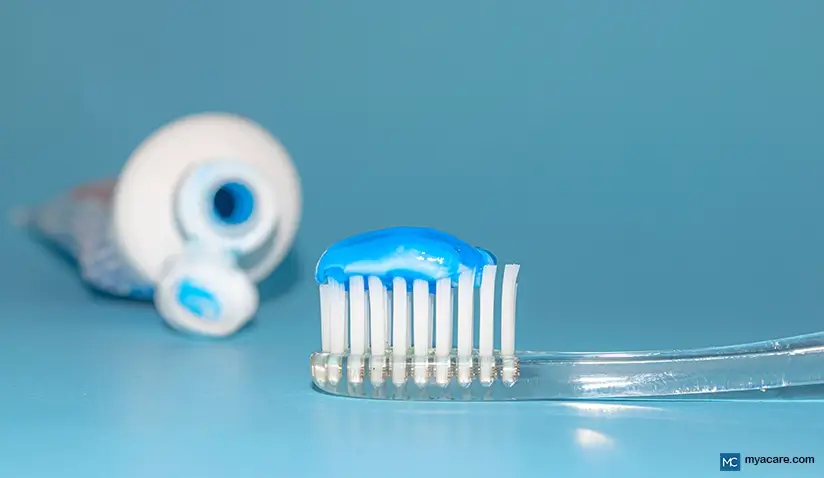Are Parabens in Oral Products Harmful for You

Parabens are chemicals used as preservatives in foods, and cosmetics and pharmaceutical industries for their antimicrobial properties. They prevent the growth of microorganisms and extend the shelf life of various products, including toothpaste and mouthwash. Initially, parabens were considered safe. However, growing research suggests that these preservatives can be toxic, irritating, and can cause allergic reactions. Consumers are increasingly conscious of products that contain parabens, and are concerned about the products’ safety. In this article, we discuss the harmful effects of parabens in oral care products and address concerns around them.
Why are parabens used?
Parabens (alkyl esters of p-hydroxybenzoic acid) are cheap, effective, and stable preservatives widely used in the food and cosmetic industries. They inhibit the growth of microbes in the products by rupturing the membrane (outer covering) of the microbial cells. In addition, parabens in cosmetics prevent their damage on exposure to oxygen or UV light. These are widely available in several forms such as methylparaben, propylparaben, ethylparaben, butylparaben, and benzylparaben.
Among oral care products, toothpaste and mouthwashes are used on a daily basis for a long time. As these products are moist, they are at risk of microbial contamination. Hence, parabens are used to keep these products free from bacteria and fungi.
Recommended usage of parabens
The US FDA (Food and Drug Administration) recommends not more than 0.1% (w/w) of parabens in food products. There is no separate regulation about their usage in cosmetics. European Union (EU) cosmetic directives allow a maximum concentration of 0.4% of paraben when only one type is used and 0.8% if multiple parabens are used.
According to the US FEMA (Flavor and Extracts Manufacturer Association), the possible average daily intakes of methylparaben and propylparaben are 0.22 and 0.237 mg/day among US adults.
Adverse effects of parabens
Below are a few adverse effects of parabens:
- Parabens have a disruptive effect on the endocrine system and cause sexual prematurity in children.
- Parabens affect the male reproductive system by lowering testosterone levels and sperm counts.
- Parabens are also known to have a carcinogenic effect. In females, parabens from cosmetics penetrate the skin and act as a weak female hormone estrogen in the body. These parabens then bind to the estrogen receptors (female hormones) and cause breast cells to multiply, increasing the risk of breast cancer.
- In some individuals, the application of paraben-containing cosmetic products can cause contact dermatitis that may result in itching, swelling, and tenderness of the skin along with the presence of blisters.
- Paraben-containing toothpaste can cause stomatitis (inflammation in the mouth) and cheilitis (inflammation of lips) in some. While the prevalence of allergic stomatitis and cheilitis due to paraben in toothpaste is rare, parabens serve as potential allergens in toothpaste.
Parabens in toothpaste and mouthwash
In oral formulations methylparaben and propylparaben are used in the concentration of 0.015%-0.2% and 0.02%-0.06% respectively. The maximum concentration of methylparaben of 0.2% corresponds to 140mg/day and 0.06% of propylparaben corresponds to 50mg/day.
Parabens present in toothpaste and mouthwash are mostly spat out. A very little amount remains in the oral cavity. The remnants are either swallowed in saliva or absorbed into blood vessels through oral mucosa (lining of the oral cavity). According to research, the maximum quantity of methylparaben ingested after using toothpaste 3 times per day was ~ 0.14 mg and that of propylparaben was 0.21 mg.
The maximum quantity of methylparaben calculated after using mouthwash was 1.53 mg which was slightly more than the possible average daily intake as reported by US Flavor and Extracts Manufacturer Association (FEMA). More quantity of paraben was ingested through mouthwash than toothpaste.
How safe is it to use paraben-containing toothpaste and mouthwash?
The US FDA and Centers for Disease Control (CDC) claim that there is insufficient evidence on adverse effects of paraben products on human health. Several long-term studies are required to substantiate these claims.
The quantities of paraben ingested via toothpaste and mouthwash are considered negligible compared to the intake from food products which is ~466mg. These values in oral care products are within the recommended concentrations and considered safe for humans irrespective of the age group. Also, parabens do not accumulate in the oral cavity or human tissues. They are quickly absorbed from the blood, broken down into simpler chemicals, and released out through urine. However, toothpaste and mouthwash should be recognized as the source of parabens and the use of parabens in oral care products should be regulated.
Consumers are now well aware of the adverse effects and are more concerned about the risk of developing cancer. As a result, there is an increasing demand for paraben-free toothpaste and mouthwash in the market. Some of the paraben-free toothpaste brands available are Himalaya herbals, Sarakan toothpaste, and Australian tea tree. Even Colgate has disregarded the use of parabens since July 2016. While the quantity of paraben ingested through oral care products is considered negligible, individuals should use their discretion based on their overall health status.
To search for the best dentists in India, Malaysia, Singapore, Spain, Thailand, Turkey, the UAE, UK and the USA, please use the Mya Care search engine.
To search for the best healthcare providers worldwide, please use the Mya Care search engine.

Dr. Shilpy Bhandari is an experienced dental surgeon, with specialization in periodontics and implantology. She received her graduate and postgraduate education from Rajiv Gandhi University of Health Sciences in India. Besides her private practice, she enjoys writing on medical topics. She is also interested in evidence-based academic writing and has published several articles in international journals.
References:
Featured Blogs



